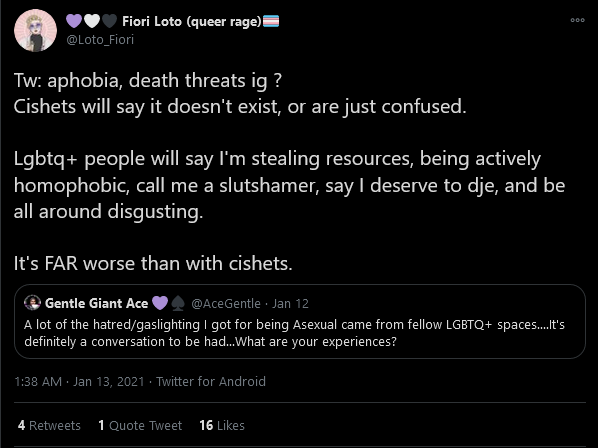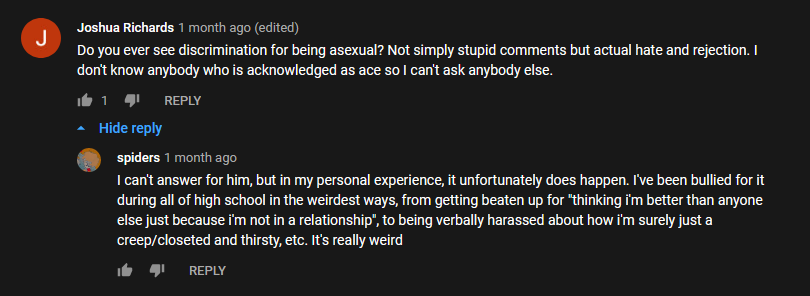○
○
Translation (via Google translate):
aphobia in numbers
9%
of asexual people over the age of 30 have heard the question “but do you at least masturbate?” in the workplace, in relation to their sexual orientation.
to understand the size of this data, consider that not all the people who answered are “out” in the workplace, not all have a job, and some work autonomously.
data taken from the annual survey of the “Collettivo Asessuale Carrodibuoi” association, visible on carrodibuoi.it
discrimination against asexual people is called aphobia
○
ACT Aces: Asexual Experiences Survey
Excerpts:
«“Much Worse Stories”
It is significant in itself that so many respondents chose not to tick clearly relevant boxes because they did not think their experience was “serious enough”.
Many write-in responses began with phrases such as: “So I don’t know if this counts, but…” or “I know other people have had worse stuff…”
I have been catcalled, have had my ass grabbed, and had unsolicited nude photos sent to my phone, i luckily have been only minorly harassed but it still is valid and traumatic and I feel so much empathy for those who have that sexual abuse trauma.
-Taylor (Location Not Given)
Taylor describes having their “ass grabbed” and being sent nude photos without consent, actions which amount to criminal assaults in many jurisdictions. They describe this as being “only minorly harassed” and express compassion for the suffering of others, in part by subordinating their own trauma.
This attitude is representative of many respondents, each claiming others have been through more trauma than themselves, while they seem to want to justify talking at all about their own feelings, even as they diminished them by comparing their trauma to the that of the unnamed and unspecified“others”.»
«81.7% of all respondents reported experiencing at least one form of discrimination, oppression or violence. As the write-in answers led to new forms of abuse being added to each of the three original categories, the final results were consolidated into four new groups.
13.3% of respondents experienced some form of Institutional Discrimination. This primarily covers medical and workplace incidents, but also occasionally schools or religious institutions.
49.9% of respondents either told stories about, or ticked the boxes “Social exclusion” or “Exclusion from LGBTQIA+ spaces”. This also includes a small number of write-in stories that weren’t about specific acts of deliberate exclusion but about feeling excluded by the world in general.
Verbal/Emotional Abuse received the highest number of responses, at 75.4%. This category covers insults, acephobic rhetoric, shaming, and many instances of relationship abuse.
The Physical/Sexual Violence category contains a small number of cases of physical violence, and a larger number of experiences of sexual violence, from unwanted touching to rape. 13.0% of respondents experienced some form of violence.»
«4.1.1. Medical Discrimination (12.2%)
The majority of these stories were about doctors refusing to believe patients about their own sexual history or engaging in unethical, unprofessional or discriminatory behaviour.
There are some stories of doctors refusing to prescribe medication, provide emergency care or discuss issues unrelated to sex as a result of medical professionals fixating on “the libido problem”.
Both medical doctors and mental health professionals such as counsellors and therapists appeared in these stories.
I suffer from major depression, complex ptsd and various other diagnoses, when my doctor asked me about my sex life I briefly said that it wasn’t relevant because of my asexuality. The doctor then wanted to take me off of my meds that I needed, because he felt that my low libido was worse than me having suicidal thoughts. He kept saying it was my meds that caused it; despite me knowing and telling him that I’ve been identifying as asexual since I was 15 which was before I’d gotten on those medications.
He wouldn’t listen. I ended up in the e.r later because I got so depressed and was close to taking my own life. I had to switch doctors and I haven’t told my current one about my asexulity because I’m scared that they’ll take me off my meds again. –Lore (Sweden)
—
I went to urgent care for the third time after I couldn’t get a UTI to heal with the antibiotics they gave me and the female doctor flat out was like, “This is an STD and I won’t give you anymore meds unless you ADMIT you’re sexually active because you’re 26 and 26 year olds have sex. You are not a virgin and you are hurting yourself with your lies.” It was really scarring. –Isabella (USA)
4.1.2. Workplace Discrimination (1.9%)
This was less common than medical abuse, but there were more “Yes” responses than the survey authors expected. Some of the workplace discrimination involved being harassed at work, including sexually harassed. There was one story about being asked deeply personal questions by a boss during a one on one management conversation, and another about being left harassing pamphlets by coworkers.
I had a shift lead who continuously made sexual jokes and asked sexual questions about my life. After telling him im ace, he’s consistuantly made fun of me and encouraged others to make the same jokes and ask me the same questions. He’s also let me go from work early several times because “i cant pull the ‘sell them with sex’ approach with people” (its a pizza shop why the fuck do we have to use sex to sell it???) –Emma (USA)
4.1.3. Religious Exclusion (0.4%)
Write-in answers identified six cases of religious exclusion. These stories primarily related to disapproval of the person’s romantic orientation and insistence on the importance of marriage. These incidents are discussed in more detail in Section 1.6. Religion (pg.18).
My parents are strictly against anything to do with the LBGT+ community. They do not know of my orientation and may never know, but they talk about the community like a plague. And though I still find myself (romantically) attracted to the opposite gender, if they where to find out they would contact the church and be in despair for days. And though I’m unsure if I where to be kicked out, I know I would be shunned. -Sophie (USA)»
«4.3. Verbal/Emotional Abuse
Initially, seven forms of verbal or emotional abuse were included as checkboxes in this section of the survey. Five additional categories were added based on write-in responses (in yellow). These categories are recommended for any future survey.
The largest category, more than three quarters of respondents overall reported experiencing some
form of verbal or emotional abuse. Quantitative data about relationship abuse was not collected, but there was an opportunity to tell a story on that theme: 77 respondents did so. (Several also told stories under sexual violence that also fit this category).
The most frequent offender in the area of relationship abuse was “Asexuality blamed by partner for relationship problems”. 11.79% of respondents checked this box.»
«13% of respondents reported at least 1 incident of physical or sexual violence.
The nature of the stories provided by respondents are in many cases potentially distressing. Included below are some representative examples, and readers are advised to read with caution and be mindful of self -care.
My best friend assualted me when I said i did not want to join her and her boyfriend for a threesome. She threw me on the ground and beat me up, grabbed my hair and held my head back while her boyfriend poured rum down my throat -Linda (USA)
—
In fear of either being raped, physically or mentally abused by someone, I chose to have sex even though I didnt want to. -Quinn (Location Not Given)
—
My now ex-husband required that I provide him with at least two intimate sexual acts each week. Ten years ago he told me that the reason he had an affair and
contemplated ending our marriage was because I was not providing sufficient intimate sexual acts. That threat was held over my head for ten years. Under that duress, I have engaged in sexual acts that I did not want to be a part of at least twice a week for ten years. And it still wasn’t enough – throughout that 10 year period he had multiple affairs and has left me for his most recent sexual partner. -Ruby (Australia)
—
My ex forced himself on me because of my lack of interest in sex and sexual activity. And made me feel extreme guilt because he said I didn’t love him because I wasn’t interested in having sex with him -Lore (Sweden)
—
The first friend I ever told about my asexuality told me I was “too cute to be asexual”. He later took me out for drinks on my birthday, drugged me, and raped me in my own home. He tried to justify it later by saying that I didn’t know my own secret wants.
-Barbara (USA)
—
He raped me many times to try and convince me that I wasn’t asexual, and once time while trying to force my mouth open for oral sex he pulled the bottom bracket off of my braces. If I spoke about being uncomfortable with sex, he would suggest the idea of me drinking to get through it. –Aadya (India)»
«While it is difficult to compare the results of the full cohort (1595 respondents) with that of males only (91 respondents), this one statistic was sufficiently dramatic to warrant discussion.
The percentage of total respondents reporting rape and sexual assault is 4% and 9% respectively. For male-identifying respondents, the figures are much higher: 12% reported rape and 21% reported sexual assault (including the “Sexual Assault by Definition” category).»
«Male respondents who ticked the boxes for sexual assault and rape were less likely to share their story than female and non-binary respondents. Conversely, men who described sexual assaults in their stories were less likely to have checked the corresponding boxes. In many instances they
seemed unaware that what they have described is sexual assault or rape. This raises questions about what men know about consent and their rights to bodily autonomy – whether they are asexual or not.
A reminder must also be added here that the survey authors were unable to identify, except where that information was given, whether a respondent is transgender.»
See the whole survey here.






















